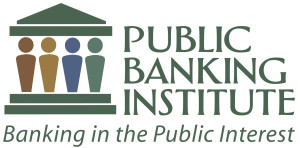
Video spotlight: Inspiring New York State public banking Town Hall
In an inspiring, informative and encouraging town hall on May 5th, New York State Senator James Sanders Jr, led a roundtable discussion “Public Banking: An Alternative Solution to Restart the Economy Post COVID-19,” with PBI Advisory Board members Dr. Amara Enyia, Emma Chappell and Prof. Michael Hudson, many State Senators and Assembly Members, and Public Bank NYC’s Jamie Tyberg.
Afterward, Dr. Hudson remarked:
“I was very impressed at how clearly the politicians realized just what was needed, and how fairly easily some major problems could be cured – provision of basic local check cashing services, payday loans [fees], association with co-ops, all in the context of the degree to which black and minority neighborhoods had been redlined as a deliberate strategy of gentrifying many of the current occupants out. Everyone seemed to be quite effective and to the point. It was heartening to be part of this meeting.”
Dr. Enyia commented:
“I’m excited about the enthusiasm shown by the NY state legislators and I believe this is a watershed moment that will increase momentum for public banks everywhere. Most promising is how this fits within a framework of a suite of proposals that will address systemic issues we’ve been facing for generations.”
Ms. Chappell added:
“It was a pleasure to talk with people who understand some of the issues that affect us every day and how public banks can help mitigate them.”
[watch the video (facebook link)]Ellen Brown: As the Fed abandons Main Street, what can states do?
In a recent article, PBI Chair Ellen Brown says the Federal Reserve’s COVID-19 policies have amounted to a covert war on the states. Meanwhile, the Fed’s bank cronies have made out extremely well and Wall Street’s serious liquidity problem — an ongoing problem long before the pandemic hit — has been hooked up to a free-flowing, multi-trillion-dollar bonanza. The best response? Turn the Fed’s policies to work for the people: By forming their own public banks, states can free themselves from dependence on the federal government, put people back to work, restore and expand local infrastructure, and replenish the local tax base.
“On the positive side, these new easy terms make it much easier for local governments to own and operate their own banks, on the stellar model of the century-old Bank of North Dakota. To fast-track the process, a state could buy a bank that was for sale locally, which would already have FDIC insurance and a master account with the central bank (something needed to conduct business with other banks and the Fed). The state could then move its existing revenues and those it gets from the CARES Act Relief Fund into the bank as deposits. Since there is no longer a deposit requirement, it need not worry if these revenues get withdrawn and spent. Any shortfall can be covered by borrowing at 0.25% from the Fed’s discount window.”
[read the full article]When Pittsburghers banked at the post office
In a new article in the Pittsburgh Post-Gazette, author Christopher Shaw calls for a return of postal banks — once a non-discriminatory financial lifeline for many of the city’s residents.
“It is time to restore the sorely needed banking services that post offices offered for much of the 20th century. From 1911 to 1966, millions of Americans deposited billions of dollars in the Postal Savings System. Because banks focused on businesses and affluent customers, working people often lacked bank accounts. This widespread financial exclusion led these ordinary citizens to turn to Uncle Sam and demand savings accounts at the federal government’s extensive network of post offices. Once this service was established, any American could walk into a post office and open a savings account. …
“Through the Postal Service, … the federal government combatted … entrenched discrimination. [Native Pittsburgher Richard] Brean emphasizes that ‘black residents of the Hill had a nondiscriminatory alternative to the banks: the United States Postal Savings System.’ Black and white, rich and poor, the Postal Service provided all Americans with inclusionary access to savings accounts and low-cost money orders. … [Mr. Brean observes,] ‘Using postal savings and postal money orders was a symbol of black financial independence.’”
[read the full article]
